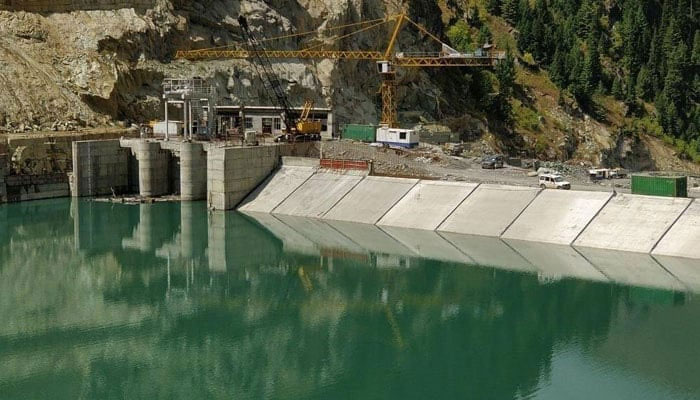Pakistan says Indus Waters Treaty fully binding, warns India against violations
India suspended treaty immediately after Pahalgam attack in held Kashmir in April
ISLAMABAD/ KARACHI: Pakistan has issued a formal response to India’s recent communications on the Indus Waters Treaty, adding that the landmark 1960 water-sharing accord remains fully operational and legally binding on both nations.
“The treaty is in full effect and binding on both parties,” Foreign Office spokesperson Shafqat Ali Khan said on Wednesday. “There is no provision in the agreement that allows for its suspension.”
India suspended the treaty immediately after the Pahalgam attack in held Kashmir in April. “Pakistan has made it clear that any breach of the treaty will not be tolerated,” Khan said, adding that the country would defend its rights at every appropriate forum.
The Indus Waters Treaty, brokered by the World Bank and signed in 1960, governs the distribution of water from the Indus River system between India and Pakistan. Despite wars and longstanding political tensions, it has been hailed as one of the most durable water-sharing agreements in the world.
Asked whether the World Bank would intervene, World Bank President Ajay Banga said the institution had no active role beyond its defined responsibilities under the treaty.
“The treaty is not suspended. It’s technically in ‘abeyance’ -- that’s the term the Indian government used,” Banga told foreign news outlet CNBC-TV18 in an interview aired on the network’s ‘Global Dialogues’ weekend programme on May 11. “There is no provision in the treaty to allow for suspension. The way it was drawn up, it either remains in place or is replaced by another -- and that requires both countries to agree.”
He clarified the World Bank’s limited mandate. “Our role is that of a facilitator, not a decision-maker. If the parties disagree, we help initiate a process to appoint a neutral expert or arbitrator. We do not choose the outcome; we just fund the mechanism through a trust established when the treaty was created.”
Banga added that neither country has formally approached the Bank in this matter. “There’s been a lot of speculation in the media about the World Bank’s role, but that’s all unfounded. The treaty is between two sovereign nations. It is their decision whether to amend or continue it.”
-
 ICE Agents 'fake Car Trouble' To Arrest Minnesota Man, Family Says
ICE Agents 'fake Car Trouble' To Arrest Minnesota Man, Family Says -
 Camila Mendes Reveals How She Prepared For Her Role In 'Idiotka'
Camila Mendes Reveals How She Prepared For Her Role In 'Idiotka' -
 China Confirms Visa-free Travel For UK, Canada Nationals
China Confirms Visa-free Travel For UK, Canada Nationals -
 Inside Sarah Ferguson, Andrew Windsor's Emotional Collapse After Epstein Fallout
Inside Sarah Ferguson, Andrew Windsor's Emotional Collapse After Epstein Fallout -
 Bad Bunny's Star Power Explodes Tourism Searches For His Hometown
Bad Bunny's Star Power Explodes Tourism Searches For His Hometown -
 Jennifer Aniston Gives Peek Into Love Life With Cryptic Snap Of Jim Curtis
Jennifer Aniston Gives Peek Into Love Life With Cryptic Snap Of Jim Curtis -
 Prince Harry Turns Diana Into Content: ‘It Would Have Appalled Her To Be Repackaged For Profit’
Prince Harry Turns Diana Into Content: ‘It Would Have Appalled Her To Be Repackaged For Profit’ -
 Prince William's Love For His Three Children Revealed During Family Crisis
Prince William's Love For His Three Children Revealed During Family Crisis -
 Murder Suspect Kills Himself After Woman Found Dead In Missouri
Murder Suspect Kills Himself After Woman Found Dead In Missouri -
 Sarah Ferguson's Plea To Jeffrey Epstein Exposed In New Files
Sarah Ferguson's Plea To Jeffrey Epstein Exposed In New Files -
 Prince William Prepares For War Against Prince Harry: Nothing Is Off The Table Not Legal Ways Or His Influence
Prince William Prepares For War Against Prince Harry: Nothing Is Off The Table Not Legal Ways Or His Influence -
 'How To Get Away With Murder' Star Karla Souza Is Still Friends With THIS Costar
'How To Get Away With Murder' Star Karla Souza Is Still Friends With THIS Costar -
 Pal Reveals Prince William’s ‘disorienting’ Turmoil Over Kate’s Cancer: ‘You Saw In His Eyes & The Way He Held Himself’
Pal Reveals Prince William’s ‘disorienting’ Turmoil Over Kate’s Cancer: ‘You Saw In His Eyes & The Way He Held Himself’ -
 Poll Reveals Majority Of Americans' Views On Bad Bunny
Poll Reveals Majority Of Americans' Views On Bad Bunny -
 Wiz Khalifa Thanks Aimee Aguilar For 'supporting Though Worst' After Dad's Death
Wiz Khalifa Thanks Aimee Aguilar For 'supporting Though Worst' After Dad's Death -
 Man Convicted After DNA Links Him To 20-year-old Rape Case
Man Convicted After DNA Links Him To 20-year-old Rape Case




